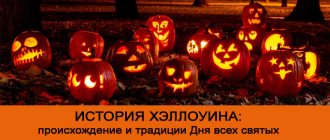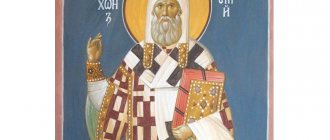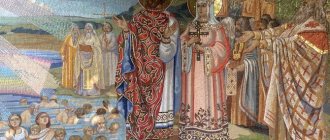All Saints' Day. All Saints Cathedral
All Saints' Day or All Saints' Week is celebrated on the first Sunday (week) after the Feast of the Holy Trinity.
History of the Feast of All Saints Orthodox holiday All Saints Day Divine service on the Feast of All Saints Who are the saints Prayers to All Saints Akathist on the Feast of All Saints Day The Greatness of All Saints Video
HISTORY OF ALL SAINTS DAY
In the 4th century, the first mentions of this holiday began to appear. In the sermon of St. John Chrysostom (IV century), he glorifies “all the saints who suffered throughout the world” and points out a special day for their veneration. St. Petersburg also mentions this holiday in his hymns. Ephraim the Syrian (IV century).
Around the 5th century, the celebration in honor of All Saints began to be celebrated on the first Sunday after Trinity; later this holiday was officially assigned to this date by the Church.
ALL SAINTS DAY
The Church considers the main idea of this day to be the glorification of all the Saints, who are our intercessors before God and helpers in prayers to the Lord throughout our lives. We often turn to one or another Saint and ask them to help pray to the Lord for us, and Saints often respond to these requests, because they see our efforts in finding our spiritual path, in forgiveness and repentance.
It is no coincidence that All Saints' Day is celebrated immediately after Trinity. After all, Trinity is considered the Birthday of the Church and, like a small sprout planted in the ground, She blossomed in the person of the holy martyrs and confessors, saints, saints and holy fools.
None of these people were born saints. They were not sinless, they all had some sins, but the most important thing is to realize them and sincerely repent. Church canons warn the Orthodox that saints cannot be considered sinless. The Gospel says that even sinners enter heaven. To the right of the crucified Savior, a thief hung on the cross, who in the last minutes of his life repented to God and asked Jesus Christ:
“Remember me, Lord, when You come in Your Kingdom”
In this short sentence one could feel faith in Jesus, in His Divinity and the thief’s readiness to repent. She turned out to be sincere, otherwise this man would not have gone to heaven.
People came to their holiness in different ways, but the result was God's grace, which, according to St. John of Damascus, made them “pure dwellings of God.”
God's grace comes with the Holy Spirit, so people who prayed earnestly to the Lord and worked to "acquire" the Holy Spirit were strong in their faith. They were given a lot, but this gift of God was honestly “earned” by them and they did not “keep” this gift to themselves; with God’s help they helped people.
At a time when Rus' was conquered by the Mongol-Tatars, Holy Prince Alexander Nevsky visited the Horde more than once, all the time softening the Tatar Khan with his meekness. Thus, he practically saved Rus' from the extermination of Christianity by the Tatars; the invaders practically did not touch Orthodox churches and did not force our people to worship their gods. The revered Russian Saint, Reverend Sergius of Radonezh, more than once came to the princes and asked them for mercy in the form of relief for his peasants, and it was not surprising that the Saint’s requests were fulfilled, because he was strong in the Holy Spirit.
It is unknown how many Saints there are in Christianity. The feat of many people will remain unknown to people. Only God knows about this. He knows everything - about the deaths for faith in Christ, about the torment, about the work of ascetic monks who lived in difficult conditions, renouncing the world, and prayed for us people before the Lord.
After a godless time, the exploits of many thousands of ordinary people who ended up in Soviet camps for their faith became known. These people “only” preached the Gospel, love for God and people, honesty and decency in their lives, and not Marxism-Leninism. While tortured, they were tempted with freedom for signing on a piece of paper, which stated that there is no God. At the cost of their health or even their lives, they did not renounce God. These are real Saints! But in our understanding, they were ordinary people, they also went to shops, studied, worked, lived a simple life, these people lived quite recently and there are still those who saw them, who talked to them. It turns out that God's grace does not go back to the early or middle ages, it is very close to us. To be closer to God, it is necessary, as with everything in life, to make an effort, as did those people whose memory is honored on All Saints’ Day, who acquired the Holy Spirit and found the anointing of grace.
All Saints' Day is not a holiday in the sense that we perceive the word. This, to be more precise, is veneration and thanksgiving to them, pure and bright people who worked miracles for the glory of God. Who did not spare their lives for the glory of Christ, won the love and respect of people.
We are all under someone's protection and patronage; each person at baptism received a name in honor of some saint. It is very useful to read about your patron, how he lived, why he became a saint. Perhaps his example will help us become at least a little like him, improve our lives and learn to live the way your patron saint did.
In his sermon on All Saints' Day, Metropolitan Anthony of Sourozh said:
“If we want to give glory to the saints, glorify our saint, justify that this name has been entrusted to us, we must learn to live as he lived, as Christ lived, as we are called to live. Otherwise, every praise that we utter to a saint will someday be a reproach to us: he knew - and did not do it ... "
SERVICE ON ALL SAINTS' DAY
On Sunday, at the morning service, the eleven Gospels are read, telling about the resurrection of Christ. And at the evening Sunday service, excerpts from the Old Testament are read to the Glory of the Saints.
At the morning service the next day, Monday, a liturgy is held, at which the Gospel of Matthew and the Epistle to the Romans are read (during the Easter period, the Acts of the Holy Apostles and the Gospel of John were read).
On the same day, Orthodox Christians begin the Apostolic (Petrov) Fast.
WHO ARE THE SAINTS
In our prayers we turn to the Lord God, to His Most Pure Mother, to the Holy Angels and Holy People.
The Mother of God stands above all the Saints, she is closest to God. Angels are “messengers” from God, disembodied spirits who carry out His will. The saints of God are holy people who pleased God with their righteous life on earth. They pray to God for us and help us. Prophets are saints who lived before the coming of Jesus Christ and predicted the future, mainly about the Savior. The apostles are disciples of Jesus Christ, after the descent of the Holy Spirit on them, they preached the Christian faith throughout all countries. At first there were twelve apostles closest to the Lord, and then seventy more were called. Peter and Paul are the Supreme Apostles; they worked more than others in spreading Christianity. Matthew, Mark, Luke and John the Evangelist are the Evangelists who wrote about the life of Jesus Christ. Equal to the Apostles are saints who, like the apostles, spread the faith of Christ on Earth (the blessed kings Constantine and Helen, the blessed Holy Prince Vladimir). Martyrs - accepted cruel torment or death for the faith of Christ. Confessors are saints who died peacefully later, after suffering torment. Great martyrs are saints who died after severe suffering (Holy Great Martyr George (the Victorious), Holy Great Martyrs Barbara, Catherine). Saints are bishops or bishops who pleased God with their righteous lives (St. Nicholas the Wonderworker, St. Alexy, Metropolitan of Moscow). Hieromartyrs are saints who suffered torment for Christ. Ecumenical teachers are teachers of the entire Christian Church (Saints Basil the Great, Gregory the Theologian, John Chrysostom). Reverends are righteous people who have retired from worldly life and observed a vow of celibacy, who have pleased God. They mostly lived in deserts and monasteries (Sergius of Radonezh, Seraphim of Sarov). Reverend martyrs are saints who suffered torment for Christ. The righteous lived like us in the world, were family people and led a righteous life pleasing to God (Righteous Saints Joachim and Anna). Unmercenaries - they healed people without any payment, cured physical and mental illnesses (healer Panteleimon, Cosma and Damian). Fools for Christ's sake are people who, for the sake of Christ, show the world strange actions, but in fact are filled with deep wisdom. They are also called blessed (Xenia of Petersburg).
GREATNESS
We magnify you, holy passion-bearers, and honor your honest sufferings, which you naturally endured for Christ.
VIDEO
Icon of the Mother of God Burning Bush
Share:
What date is Halloween 2021 in Russia?
Considering that Halloween came from other countries, is based on foreign, unfamiliar traditions, is associated with the Catholic religion (but is not celebrated in the religious calendar), in Russia it is celebrated on the same day as abroad. The date does not change - October 31.
What does Russia have to do with it?
As a result of globalization, foreign traditions and features of a foreign culture, albeit pagan, have spread significantly. They also reached Russia, but according to the results of sociological surveys, no more than 3% of the population celebrates this day.
Icon and traditions of celebration
The icon dedicated to the holiday was painted in the 10th century. The ancient sacramentary is kept in the Göttingen University Library. The icon depicts the apostles and saints kneeling and bowing to Jesus Christ. He himself is depicted in the center as a lamb. Later the lamb was replaced by God the Father or the Holy Trinity.
The Eastern Church commemorates the saints on the seventh day after Trinity. On the day of Pentecost, the Christian Church arose from God the Spirit. And the saints who carried the name of God to the masses became the fruit of the church and the Spirit. The holiday emphasizes that no one was born a saint; ordinary people become saints. And it is not their sinlessness that is revered, not the miracles predicted by them, not their ascetic deeds, but the grace of God that sprouted in their souls, thereby covering all their sins. And the special attitude of the church towards them is explained by admiration for their willingness to lay down their lives for faith and God.
Important: Priests in Orthodox churches conduct a festive liturgy. Canons of praise and prayer are read in the name of the followers of the Lord God. A Christian believer must attend a church service and pray either to his saint or to all the saints together.
The holiday is celebrated by Orthodox Christians of all countries. In some countries, for example Croatia, this is a day off. Orthodox order obliges us to visit the graves of relatives and put them in order. Also, Kindness Day will be held soon.
Orthodox Christians do not wear monster masks
Iconography
In that part of the Orthodox Church that was within the Ottoman Empire, by the beginning of the 18th century, a stable iconography for the Week of All Saints was established. This image shows the Lord Jesus Christ at His Second Coming, seated on a throne above heaven, and surrounded by a host of holy angels and people. Directly on the sides of the throne Adam and Eve bow to Christ. In the lower left corner is the biblical patriarch Abraham with the soul of the righteous in his bosom, according to the narrative in Luke. 16, 22. In the middle of the lower part of the icon is a prudent thief, crucified with Christ and confessing him to God. In the lower right corner is the Old Testament patriarch Jacob.
Reading the Gospel:
Gospel of Matthew, chapter 10, verses 32 - 33, 37 - 38, chapter 19, verses 27 - 30
Read excerpt
32 Therefore everyone who confesses Me before men, him will I also confess before My Father who is in heaven; 33 But whoever denies Me before men, him will I also deny before My Father who is in heaven. … 37 Whoever loves father or mother more than Me is not worthy of Me; and whoever loves a son or daughter more than Me is not worthy of Me; 38 And whoever does not take up his cross and follow Me is not worthy of Me. … 27 Then Peter answered and said to Him: Behold, we have left everything and followed You; what will happen to us? 28 Jesus said to them, “Truly I say to you, that you who have followed Me, in the end of life, when the Son of Man sits on the throne of His glory, you also will sit on twelve thrones, judging the twelve tribes of Israel. 29 And everyone who has left houses, or brothers, or sisters, or father, or mother, or wife, or children, or lands, for My name’s sake, will receive a hundredfold and will inherit eternal life. 30 But many who are first will be last, and those who are last will be first. Collapse
Bishop Feoktist (Igumnov) comments
Priest Stefan (Domuschi) comments
Catholic holiday
Living in different countries dictates different traditions to nationalities. The Austrians, for example, combine the celebration of All Saints with the next day, when it is customary to remember the dead. In Austria, everyone goes to the graves of their dead relatives (find out what date Radonitsa is in 2020), they hold memorial processions with candles in the streets, everyone sings songs. By the way, a burning candle is a mandatory attribute of the holiday. And in the Austrian regions, remembering all those who drowned, they lower wreaths into the water, or give pieces of bread to people they meet.
In Tyrol they even set special tables with treats for the dead. The Belgians also perform similar rituals: they light candles, clean up the graves, and arrange flower bouquets. All Saints' Day in Belgium is officially called a non-working day. In Spain, too, everyone is on vacation, chestnuts are roasted in Galicia and Catalonia, and a fair is held in Alicante. Residents of hot Madagascar consider the celebration an extremely important day, and arrange the reburial of their ancestors. The ashes of the dead, kept in family crypts, are taken out, wrapped in cloth, and brought home for one night. And the next morning they return the ashes to their place. During the day, magnificent celebrations are held, with the participation of all living people.










